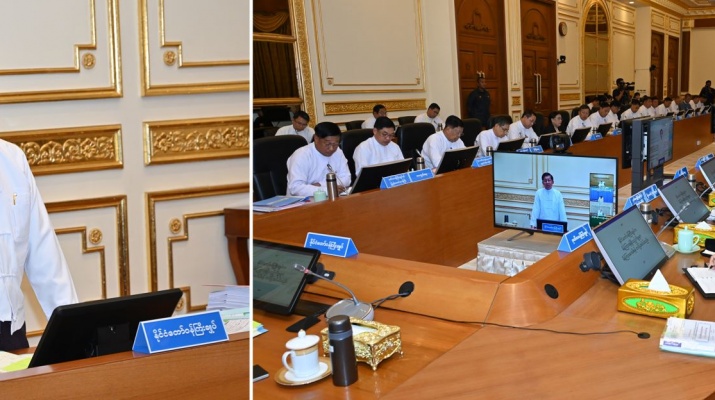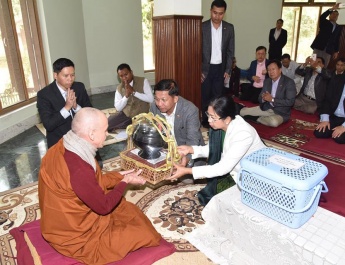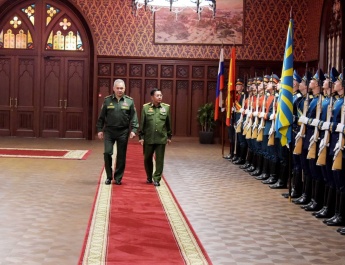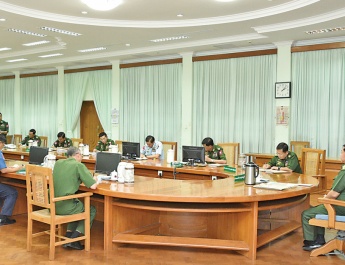NAY PYI TAW October 21
The Union Government meeting 7/2024 held at the meeting hall of the State Administration Council Chairman’s Office here this morning, addressed by Chairman of State Administration Council Prime Minister Senior General Min Aung Hlaing.
Also present were Vice Chairman of State Administration Council Deputy Prime Minister Vice-Senior General Soe Win, union ministers, union level officials, the Nay Pyi Taw Council chair, Chin State chief minister and officials. Region/state chief ministers took part in the meeting through video conferencing.
Enumeration of population and housing census
In his keynote address, the Senior General said the national census was enumerated from 1 to 15 October. Collection was completed in many of the areas, but some are still remaining.
As population and housing census must be enumerated as a national cause, arrangements are underway to undertake the task in the areas that are still remaining due to security. He thanked and recognized all the persons who participated in the enumeration task sector wise.
Rehabilitation of flood-hit areas
The Nay Pyi Taw Council Area and regions and states faced floods due to the effects of typhoon Yagi and low depression area formed in the Bay of Bengal.
Human death due to the flood was recorded 444 to this date. There were also domestic animal fatalities, property, road and bridge damages and machinery losses. The recent one is the worst among the damages caused by heavy rains in the country. The collective assistance rendered by well-wishers and welfare organizations is also recognized.
As rehabilitation in the floodhit areas is an enormous job, it needs the involvement of the entire people, apart from State’s financial assistance. Hence, the State conducted donation ceremonies three times and received a total of over Ks-53 billion. Some rendered assistance through individual- or organization-wise donations made at the relevant flood-hit areas. Likewise, members of Tatmadaw, Myanmar Police Force and Red Cross societies at all levels joined forces in the rehabilitation task. The State thanked them and recognized their contributions.
Preservation of Myanmar traditional culture
The 25th Myanmar Traditional Cultural Performing Arts Competitions was held to nurture and preserve Myanmar traditions and culture, and soon, the prize-presentation ceremony will be held. Officials who joined hands in the respective sectors for the success of the Competitions are honoured. Arrangements should be made to enable the participation of all culturelovers from regions and states in the Competitions. The country will be able to preserve its cultural heritage through the Competitions. The country will be strong and sustainable, only if it can preserve its culture. In this regard, all the national brethren of the Union should join hands in the task.
Responsibilities of ministries and region/state governments
Ministries and region/state chief ministers are shouldering their sector-wise duties and serving the regional interest. Hence, they must submit required information to the State-level institutions, and through this method, the latter will provide directives and support as and when necessary. Especially, the prevailing situation in border areas must be prioritized as they need emergency response.
Any difficulties in contacting the Union-level offices and departments must be informed. Honesty and perfection are required in shouldering the State duties as the efficacy of the performances will be tested.
Efforts must be made to stand as a country producing food and basic needs
The government has exerted efforts to stimulate the economy, which saw a downturn due to COVID-19. As the government has encouraged the manufacturing sector based on major sectors of the country such as agriculture and livestock breeding, the economy has grown.
Compared with regional countries, however, the economy has still weakened. Although the government has pushed the agriculture sector to try to meet targets, appropriate progress has not been achieved.
Responsible officials in respective regions and states are required to exert efforts to meet crop production targets. It is necessary to establish model plantations to set good examples in regions and states. Similarly, efforts must be made to boost capacity for multicropping. If efforts are made to meet crop targets, related production and services will develop and the GDP of the country will increase.
Concerted effort must be made for economic development of the country and full-fledged operations of the manufacturing sector.
It is necessary to achieve success in production industries based on agriculture and livestock breeding by beneficially utilizing favourable conditions and sound foundations that the country has already possessed.
Water must be utilized beneficially. Land must be properly prepared and techniques from other countries that are successful in agriculture and livestock breeding must be learnt and utilized. It is necessary to boost agricultural production to promote exports. Utilizing favourableconditions the country has already possessed amounts to the strength of the country. Efforts must be made to take pride as a country producing food and basic needs by successfully carrying out agriculture and livestock breeding tasks.
Livestock breeding tasks must be carried out systematically. It will be greatly beneficial if animals are raised in shelters instead of breeding them traditionally.
To nurture human resources that will contribute to agriculture and livestock breeding, basic agriculture, livestock breeding and technical schools are being opened. If agriculture and livestock breeding tasks are successfully carried out, the nation will be a country that produces foodstuffs abundantly.
Industries based on timber, bamboo, rattan and other forest products must be able to manufacture high quality products for exports. Opportunities must be created and techniques must be developed to do so. After reaping forest products, new plants must be recultivated. If resources of the country can be utilized effectively, it will be beneficial for the country and economic development will be achieved.
It can be seen that priority is given to foodstuff industries in implementing MSMEs. It is necessary to encourage businesses to manufacture value-added products from other renewable resources in the country. For instance, job opportunities can be created and economic development can be achieved if value-added products based on timber, bamboo, rattan and rubber can be manufactured.
In connection with cotton, Magway, Sagaing and Mandalay regions are required to play a leading role in implementing industries based on cotton. There are textile industries in all regions and states and measures must be taken to meet the cotton demand of the country. Industries related to cotton must be implemented with farsightedness and if high quality textiles can be produced from cotton grown in the country, imports of textiles from other countries can be reduced and surplus can be exported after fulfilling the demand. Efforts must be made to create a new era for cotton. Similarly, rubber material production must be boosted and imports of them must be reduced. Measures must be taken to meet the domestic rubber demand by encouraging rubber cultivation.
Education and tourism sectors
Universities will be reopened soon. Measures must be taken to enable all school-aged children to go to school and to allow all of them to study safely, conveniently and happily. It is necessary to take steps for cleanliness to enable students to study conveniently after schools that were temporarily closed due to natural disasters have been reopened and to open extra classes so that they will be able to learn full curriculums. Efforts will be made to open more schools, to enhance the capabilities of teachers and to maintain features of school buildings.
Currently, with the onset of the open season, it is expected that both domestic and international travel will increase.
Therefore, relevant states and regions are instructed to maintain clean, pleasant, and flowerfilled destinations to attract visitors. Similarly, it is necessary to work on producing high-quality local products and ensure that hotels and guesthouses maintain cleanliness under the supervision of responsible authorities.
Following this, the Chairman of the Nay Pyi Taw Council, Chief Ministers of regions and states provided updates on the status of ongoing activities in education, healthcare, agriculture, and manufacturing.
In response, the Senior General emphasized the need for the development of model farms for agricultural progress and for the maintenance of trees planted during the rainy season to ensure their growth. He also highlighted the importance of communicating policies down to the grassroots level and encouraged coordinated efforts for regional development. Successful execution of tasks requires a process of checking, rechecking, and counter-checking.
Regarding regional security, it was noted that public safety measures are actively in place, and security operations in relevant areas need to be systematically implemented. Additionally, preparations are underway for competitive participation in the National Sports Festival to be held in December.
Union Ministers then presented reports on their respective sectors.
Later, Senior General Min Aung Hlaing discussed matters such as regulating coastal and offshore fishing activities in accordance with rules, promoting prawn farming for the development of the seafood industry, and increasing rubber production yields.
He also addressed the need for screening and permitting overseas study programs according to established rules. In his closing remarks, the Senior General reiterated the importance of ministries achieving their set goals by prioritizing key aspects of national plans. Efforts are being made to prepare for the upcoming elections, including conducting a population and housing census, as well as other preelection preparations in a systematic manner.
It was noted that the five-point roadmap is being implemented, with a focus on achieving economic objectives. To ensure the success of economic plans, Union-level ministries must oversee their execution systematically.
If each goal is pursued methodically, tasks will be accomplished successfully. The meeting then concluded with instructions for implementing responsibilities effectively and addressing employees’ performance under strict discipline, marking the end of the session.





